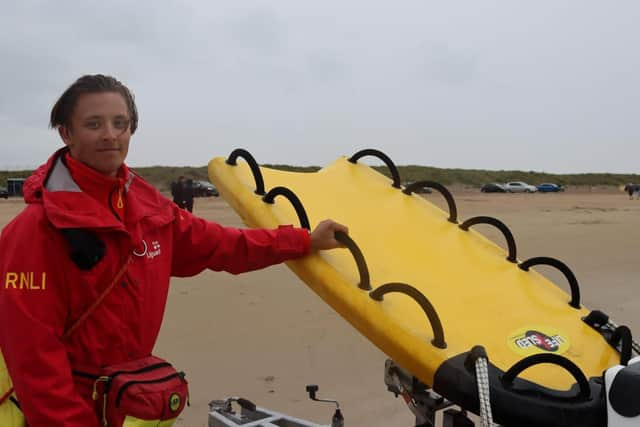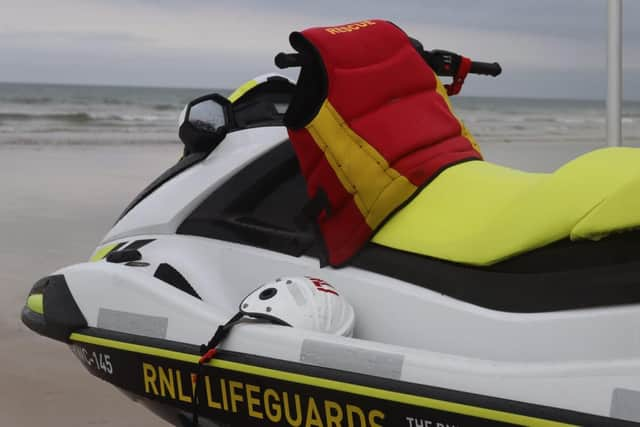Rip current warning as 8 rescued in 24 hrs at Portrush & Co. Derry beaches
and live on Freeview channel 276
RNLI are urging those planning a trip to the beach during the current spell of hot weather to choose a lifeguarded beach and to only swim between the red and yellow flags following incidents in Portstewart and Portrush.
Karl O’Neill, RNLI Lead Lifeguard Supervisor said sea swells are expected particularly along the Causeway Coast beaches in the coming days which will “intensify the risk of people getting into difficulty in rip currents”.
Advertisement
Hide AdAdvertisement
Hide Ad“In recent days, our lifeguard team has rescued a large number of people from rip currents. Yesterday alone, six people were rescued at Portrush East Strand while this evening, another two were rescued from a rip current at Portstewart Strand,” he said.


“We would encourage people if they can, to also avoid swimming near rocks or sea defences where there can be permanent rip currents that pull you out to sea and where we are also experiencing incidents where people are not just suffering from the effects of struggling in the water but who are also picking up injuries such as cuts from being dragged along the rocks.
“It is imperative that people planning on visiting the coast to enjoy this beautiful weather do so safely by visiting a lifeguarded beach and by ensuring they swim between the red and yellow flags only, which mark the safest stretch of water and the area our lifeguards patrol,” Karl added.
The latest rescues come just a fortnight after a father and son were rescued in waters at Benone beach. Lifeguard Andrzej had just helped bring a body boarder back to the safe area between the flags. He then patrolled down towards the Umbra, the minor river which flows across Benone’s bathing beach and noticed two heads in the water about 500 metres out of the safe swimming zone.
Advertisement
Hide AdAdvertisement
Hide AdOne of them heard the engine of the RWC and raised his arm to signal for help. As Andrzej circled round to go to the rescue he noticed one of the two men had sunk beneath the water. Using his hands Andrzej managed to pull him onto the rescue sled and then reached out to get the second casualty, who he later learned was the first man’s son. The son was struggling, but managing to keep his head above water, so Andrzej pulled him onto the sled also.


With both men onboard the rescue sled, Andrzej headed back to shore and called RNLI Lifeguards for medical assistance, and they administrated oxygen to the casualty.
Speaking after the rescue Andrzej said: “In the heat of the moment, my training kicked in and I just wanted to get them back on to the sand. It could have been a very serious situation if I hadn’t seen them out swimming, and if the son hadn’t raised his arm for help. When you swim at the beach, try to stay as close to the lifeguarded patrol zone as possible, so we can see you and get to you as quickly as we can.
“Luckily, the son knew what to do and did the right thing. If you get into difficulty in the water, lean back, stretch out your arms and legs, then call for help or raise your arm.”
Advertisement
Hide AdAdvertisement
Hide AdThe RNLI is also reminding people about the dangers of cold water shock, which can seriously affect breathing and movement, and can occur in any water temperature below 15c.
Over half of those who get into danger at the coast each year never planned to enter the water – slips, trips and falls are a significant problem. The RNLI is urging people to Float to Live if they get into trouble in the water. This means leaning back and spreading your arms and legs to stay afloat, controlling your breathing, then calling for help or swimming to safety. In a coastal emergency, call 999 or 112 for the Coastguard, or the police if you are inland.
The RNLI’s beach safety advice: Visit a lifeguarded beach and swim between the red and yellow flags; Check the weather forecast, tide times and read local hazard signage to understand local risks before venturing out
Keep a close eye on your family – on the beach and in the water – don’t allow your family to swim alone; If you fall into water unexpectedly, float to live. Fight your instinct to thrash around, lean back, extend your arms and legs, and float; In an emergency, dial 999 or 112 and ask for the Coastguard. Lifeguarded beaches in the north can be found at: rnli.org/find-my-nearest/lifeguarded-beaches